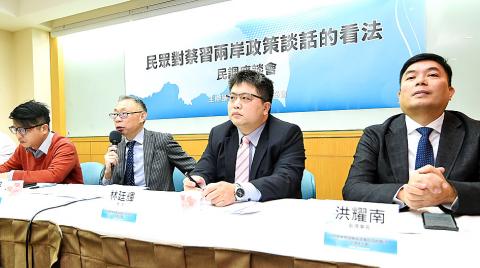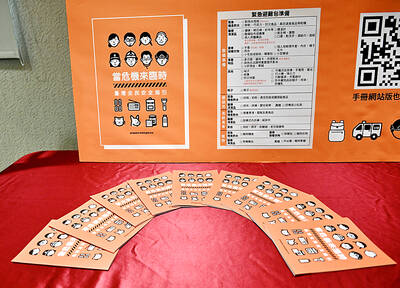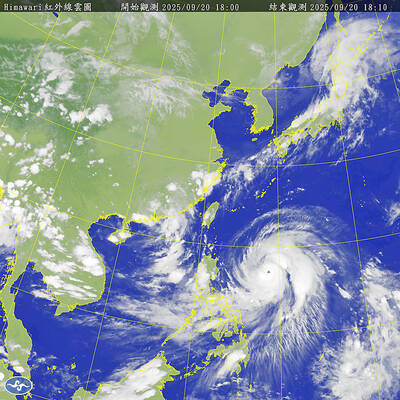More than 80 percent of Taiwanese do not accept the “one country, two systems” formula and a majority reject the existence of the so-called “1992 consensus,” a survey published yesterday by the Cross-Strait Policy Association found.
Asked whether they supported Chinese President Xi Jinping’s (習近平) proposal of a “one country, two systems” model for unification, which would make Taiwan a local government and eliminate the Republic of China (ROC), 80.9 percent answered “no” and 13.7 percent said “yes.”
Even among respondents who identify with the pan-blue camp, the majority — 64.7 percent of Chinese Nationalist Party (KMT) supporters and 63 percent of People First Party supporters — rejected the formula, the survey found.

Photo: Chu Pei-hsiung, Taipei Times
In addition, 68.5 percent did not think Beijing’s “one China” principle has room for the ROC, versus 25.5 percent who believed it does.
As for the “1992 consensus,” 55.7 percent of respondents did not think it exists, while 34.1 percent thought otherwise, with pan-blue supporters generally believing in its existence, the poll showed.
The “1992 consensus” — a term former Mainland Affairs Council chairman Su Chi (蘇起) in 2006 admitted making up in 2000 — refers to a tacit understanding between the KMT and the Chinese Communist Party that both sides acknowledge there is “one China,” with each side having its own interpretation of what “China” means.
However, Xi in a speech in Beijing on Wednesday last week said that it means “both sides of the [Taiwan] Strait belong to ‘one China’ and will work jointly to seek national unification.”
Seventy-eight percent of respondents agreed with President Tsai Ing-wen’s (蔡英文) stance that cross-strait political negotiations need a mandate from the people, should be subject to public scrutiny and must be carried out by the governments on both sides of the Strait.
Tsai was responding to Xi’s expression of willingness to engage in dialogue on unification and cross-strait political issues with all political parties, groups and individuals from Taiwan on the basis of the “one China” principle.
Tsai’s “four musts” and calls for setting up of a three-part security network for cross-strait exchanges in her New Year’s address received overwhelming public support, garnering support from 85.2 percent and 87.3 percent of respondents respectively, the poll showed.
The “four musts” state that China must recognize the existence of the ROC; must respect the values of democracy and freedom that Taiwan’s 23 million people hold dear; must resolve cross-strait differences in a peaceful and equitable manner; and must engage in negotiations with the government of Taiwan or an institution with a government mandate.
The three-part security network includes parts to strengthen security of people’s livelihoods, enhance information security and improve security protecting democracy in cross-strait interactions.
Asked if they were satisfied with Tsai’s overall response to Xi’s speech, 61.6 percent answered “yes,” while 28.2 percent said “no.”
The poll, conducted on Saturday and Sunday, collected 1,047 valid samples, and has a confidence level of 95 percent and a margin of error of 2.99 percentage points.

One of two tropical depressions that formed off Taiwan yesterday morning could turn into a moderate typhoon by the weekend, the Central Weather Administration (CWA) said yesterday. Tropical Depression No. 21 formed at 8am about 1,850km off the southeast coast, CWA forecaster Lee Meng-hsuan (李孟軒) said. The weather system is expected to move northwest as it builds momentum, possibly intensifying this weekend into a typhoon, which would be called Mitag, Lee said. The radius of the storm is expected to reach almost 200km, she said. It is forecast to approach the southeast of Taiwan on Monday next week and pass through the Bashi Channel

The number of Chinese spouses applying for dependent residency as well as long-term residency in Taiwan has decreased, the Mainland Affairs Council said yesterday, adding that the reduction of Chinese spouses staying or living in Taiwan is only one facet reflecting the general decrease in the number of people willing to get married in Taiwan. The number of Chinese spouses applying for dependent residency last year was 7,123, down by 2,931, or 29.15 percent, from the previous year. The same census showed that the number of Chinese spouses applying for long-term residency and receiving approval last year stood at 2,973, down 1,520,

EASING ANXIETY: The new guide includes a section encouraging people to discuss the threat of war with their children and teach them how to recognize disinformation The Ministry of National Defense’s All-Out Defense Mobilization Agency yesterday released its updated civil defense handbook, which defines the types of potential military aggression by an “enemy state” and self-protection tips in such scenarios. The agency has released three editions of the handbook since 2022, covering information from the preparation of go-bags to survival tips during natural disasters and war. Compared with the previous edition, released in 2023, the latest version has a clearer focus on wartime scenarios. It includes a section outlining six types of potential military threats Taiwan could face, including destruction of critical infrastructure and most undersea cables, resulting in

The Central Weather Administration (CWA) yesterday said that it expected to issue a sea warning for Typhoon Ragasa this morning and a land warning at night as it approached Taiwan. Ragasa intensified from a tropical storm into a typhoon at 8am yesterday, the CWA said, adding that at 2pm, it was about 1,110km east-southeast of Oluanpi (鵝鑾鼻), Taiwan’s southernmost tip. The typhoon was moving northwest at 13kph, with sustained winds of up to 119kph and gusts reaching 155kph, the CWA Web site showed. Forecaster Liu Pei-teng (劉沛滕) said that Ragasa was projected to strengthen as it neared the Bashi Channel, with its 200km